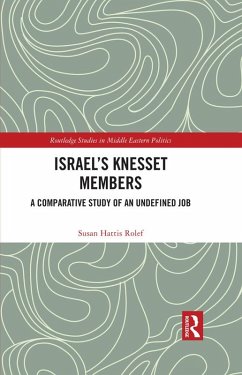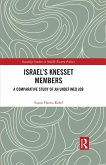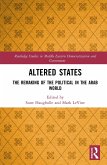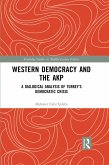44,95 €
44,95 €
inkl. MwSt.
Sofort per Download lieferbar

22 °P sammeln
44,95 €
Als Download kaufen

44,95 €
inkl. MwSt.
Sofort per Download lieferbar

22 °P sammeln
Jetzt verschenken
Alle Infos zum eBook verschenken
44,95 €
inkl. MwSt.
Sofort per Download lieferbar
Alle Infos zum eBook verschenken

22 °P sammeln
- Format: PDF
- Merkliste
- Auf die Merkliste
- Bewerten Bewerten
- Teilen
- Produkt teilen
- Produkterinnerung
- Produkterinnerung

Bitte loggen Sie sich zunächst in Ihr Kundenkonto ein oder registrieren Sie sich bei
bücher.de, um das eBook-Abo tolino select nutzen zu können.
Hier können Sie sich einloggen
Hier können Sie sich einloggen
Sie sind bereits eingeloggt. Klicken Sie auf 2. tolino select Abo, um fortzufahren.

Bitte loggen Sie sich zunächst in Ihr Kundenkonto ein oder registrieren Sie sich bei bücher.de, um das eBook-Abo tolino select nutzen zu können.
Taking Members of the Israeli Knesset, MKs, as a case study, this book offers a comparative analysis of the role of Members of Parliament (MPs) in democracies around the world.
- Geräte: PC
- mit Kopierschutz
- eBook Hilfe
Andere Kunden interessierten sich auch für
![Israel's Knesset Members (eBook, ePUB) Israel's Knesset Members (eBook, ePUB)]() Susan Hattis RolefIsrael's Knesset Members (eBook, ePUB)44,95 €
Susan Hattis RolefIsrael's Knesset Members (eBook, ePUB)44,95 €![Understanding Israel (eBook, PDF) Understanding Israel (eBook, PDF)]() Understanding Israel (eBook, PDF)41,95 €
Understanding Israel (eBook, PDF)41,95 €![Altered States (eBook, PDF) Altered States (eBook, PDF)]() Altered States (eBook, PDF)41,95 €
Altered States (eBook, PDF)41,95 €![Western Democracy and the AKP (eBook, PDF) Western Democracy and the AKP (eBook, PDF)]() Mehmet Celil ÇelebiWestern Democracy and the AKP (eBook, PDF)37,95 €
Mehmet Celil ÇelebiWestern Democracy and the AKP (eBook, PDF)37,95 €![Mauritania's Colonels (eBook, PDF) Mauritania's Colonels (eBook, PDF)]() Boubacar N'DiayeMauritania's Colonels (eBook, PDF)45,95 €
Boubacar N'DiayeMauritania's Colonels (eBook, PDF)45,95 €![Party Politics in Japan (eBook, PDF) Party Politics in Japan (eBook, PDF)]() Party Politics in Japan (eBook, PDF)43,95 €
Party Politics in Japan (eBook, PDF)43,95 €![Israel's National Security Predicament (eBook, PDF) Israel's National Security Predicament (eBook, PDF)]() David RodmanIsrael's National Security Predicament (eBook, PDF)41,95 €
David RodmanIsrael's National Security Predicament (eBook, PDF)41,95 €-
-
-
Taking Members of the Israeli Knesset, MKs, as a case study, this book offers a comparative analysis of the role of Members of Parliament (MPs) in democracies around the world.
Dieser Download kann aus rechtlichen Gründen nur mit Rechnungsadresse in A, B, BG, CY, CZ, D, DK, EW, E, FIN, F, GR, HR, H, IRL, I, LT, L, LR, M, NL, PL, P, R, S, SLO, SK ausgeliefert werden.
Produktdetails
- Produktdetails
- Verlag: Taylor & Francis eBooks
- Seitenzahl: 348
- Erscheinungstermin: 29. Juli 2022
- Englisch
- ISBN-13: 9781000603460
- Artikelnr.: 64150221
- Verlag: Taylor & Francis eBooks
- Seitenzahl: 348
- Erscheinungstermin: 29. Juli 2022
- Englisch
- ISBN-13: 9781000603460
- Artikelnr.: 64150221
- Herstellerkennzeichnung Die Herstellerinformationen sind derzeit nicht verfügbar.
Susan Hattis Rolef received a BSc in International Relations from the London School of Economics, UK, in 1965, and her PhD from the University Institute of International Relations in Geneva, Switzerland, in 1970. She has lectured at the Hebrew University in Jerusalem in the Department of International Relations. Between the years 1994 to 2010 she held various positions in the Knesset, inter alia in the library, in the construction of the Knesset website, as a researcher in the Knesset Research and Information Center and assisted the Knesset Foreign Affairs Department.
List of Tables
About the Author
Preface
Acknowledgments
Lexicon of Acronyms, Terms, and Institutions
Introduction: An Undefined Job - Theoretical Background
Part I: The Essence of the Job and its Components
1. The Essence of Representation
Section I.A: The Classic Parliamentary Roles
2. The Legislative Role
3. The Constituent and Reformatory Role
4. Parliamentary Oversight and Scrutiny of the Executive Branch
5. Parliamentary and National Agenda Setting
Section I.B: Activity on Behalf of Voters, Citizens, Constituencies, and Sectors
6. Mediation Between Citizens and the Authorities
7. Representation of an Electoral District or a Sector
Section I.C: Positions that Serve the Running of Parliament and the Government
8. Official and Semi-official Positions
9. International Activity
10. The Judicial Role
Section I.D: Additional Roles
11. The Legitimation Role
12. The Effect of Belonging to a Party that is in the Government or in the Opposition
Part II: Restrictions and Limitations to the Job
13. Reservations to Candidacy for and Membership in Parliament
14. Compliance with the Law
15. Conflict of Interests
16. Political Party Activity
17. Activity for Reelection
18. Are Defense of Democracy and its Promotion Part of the Job?
Part III: Why the Job Ought to be Defined
19. The Process of Professionalization
19.1. Is Membership in Parliament a Profession?
19.2. Membership in Parliament as Part of a Political Career and as a Fulltime Occupation
19.3. Improving the Professional Qualifications of the MP
Section III.A.: The Rights and Duties of MPs that are Defined as a Function of their Job
20. The Immunity of MPs
21. Determining MPs' Salaries
22. Reimbursement of Expenses
23. Employment of Parliamentary Assistants
24. Rules of Ethics
Section III.B.: Ignorance of the Public and Amongst MPs About the Job
25. Lack of Knowledge by the Public About the Essence of the MP's Job
26. Do the MPs Themselves Know What Their Job Is?
Conclusion
Epilogue
Bibliography
About the Author
Preface
Acknowledgments
Lexicon of Acronyms, Terms, and Institutions
Introduction: An Undefined Job - Theoretical Background
Part I: The Essence of the Job and its Components
1. The Essence of Representation
Section I.A: The Classic Parliamentary Roles
2. The Legislative Role
3. The Constituent and Reformatory Role
4. Parliamentary Oversight and Scrutiny of the Executive Branch
5. Parliamentary and National Agenda Setting
Section I.B: Activity on Behalf of Voters, Citizens, Constituencies, and Sectors
6. Mediation Between Citizens and the Authorities
7. Representation of an Electoral District or a Sector
Section I.C: Positions that Serve the Running of Parliament and the Government
8. Official and Semi-official Positions
9. International Activity
10. The Judicial Role
Section I.D: Additional Roles
11. The Legitimation Role
12. The Effect of Belonging to a Party that is in the Government or in the Opposition
Part II: Restrictions and Limitations to the Job
13. Reservations to Candidacy for and Membership in Parliament
14. Compliance with the Law
15. Conflict of Interests
16. Political Party Activity
17. Activity for Reelection
18. Are Defense of Democracy and its Promotion Part of the Job?
Part III: Why the Job Ought to be Defined
19. The Process of Professionalization
19.1. Is Membership in Parliament a Profession?
19.2. Membership in Parliament as Part of a Political Career and as a Fulltime Occupation
19.3. Improving the Professional Qualifications of the MP
Section III.A.: The Rights and Duties of MPs that are Defined as a Function of their Job
20. The Immunity of MPs
21. Determining MPs' Salaries
22. Reimbursement of Expenses
23. Employment of Parliamentary Assistants
24. Rules of Ethics
Section III.B.: Ignorance of the Public and Amongst MPs About the Job
25. Lack of Knowledge by the Public About the Essence of the MP's Job
26. Do the MPs Themselves Know What Their Job Is?
Conclusion
Epilogue
Bibliography
List of Tables; About the Author; Preface; Acknowledgments; Lexicon of Acronyms, Terms, and Institutions; Introduction: An Undefined Job - Theoretical Background; Part I: The Essence of the Job and its Components; 1. The Essence of Representation; Section I.A: The Classic Parliamentary Roles; 2. The Legislative Role; 3. The Constituent and Reformatory Role; 4. Parliamentary Oversight and Scrutiny of the Executive Branch; 5. Parliamentary and National Agenda Setting; Section I.B: Activity on Behalf of Voters, Citizens, Constituencies, and Sectors; 6. Mediation Between Citizens and the Authorities; 7. Representation of an Electoral District or a Sector; Section I.C: Positions that Serve the Running of Parliament and the Government; 8. Official and Semi-official Positions; 9. International Activity; 10. The Judicial Role; Section I.D: Additional Roles; 11. The Legitimation Role; 12. The Effect of Belonging to a Party that is in the Government or in the Opposition; Part II: Restrictions and Limitations to the Job; 13. Reservations to Candidacy for and Membership in Parliament; 14. Compliance with the Law; 15. Conflict of Interests; 16. Political Party Activity; 17. Activity for Reelection; 18. Are Defense of Democracy and its Promotion Part of the Job?; Part III: Why the Job Ought to be Defined; 19. The Process of Professionalization; 19.1. Is Membership in Parliament a Profession?; 19.2. Membership in Parliament as Part of a Political Career and as a Fulltime Occupation; 19.3. Improving the Professional Qualifications of the MP; Section III.A.: The Rights and Duties of MPs that are Defined as a Function of their Job; 20. The Immunity of MPs; 21. Determining MPs' Salaries; 22. Reimbursement of Expenses; 23. Employment of Parliamentary Assistants; 24. Rules of Ethics; Section III.B.: Ignorance of the Public and Amongst MPs About the Job; 25. Lack of Knowledge by the Public About the Essence of the MP's Job; 26. Do the MPs Themselves Know What Their Job Is?; Conclusion; Epilogue; Bibliography
List of Tables
About the Author
Preface
Acknowledgments
Lexicon of Acronyms, Terms, and Institutions
Introduction: An Undefined Job - Theoretical Background
Part I: The Essence of the Job and its Components
1. The Essence of Representation
Section I.A: The Classic Parliamentary Roles
2. The Legislative Role
3. The Constituent and Reformatory Role
4. Parliamentary Oversight and Scrutiny of the Executive Branch
5. Parliamentary and National Agenda Setting
Section I.B: Activity on Behalf of Voters, Citizens, Constituencies, and Sectors
6. Mediation Between Citizens and the Authorities
7. Representation of an Electoral District or a Sector
Section I.C: Positions that Serve the Running of Parliament and the Government
8. Official and Semi-official Positions
9. International Activity
10. The Judicial Role
Section I.D: Additional Roles
11. The Legitimation Role
12. The Effect of Belonging to a Party that is in the Government or in the Opposition
Part II: Restrictions and Limitations to the Job
13. Reservations to Candidacy for and Membership in Parliament
14. Compliance with the Law
15. Conflict of Interests
16. Political Party Activity
17. Activity for Reelection
18. Are Defense of Democracy and its Promotion Part of the Job?
Part III: Why the Job Ought to be Defined
19. The Process of Professionalization
19.1. Is Membership in Parliament a Profession?
19.2. Membership in Parliament as Part of a Political Career and as a Fulltime Occupation
19.3. Improving the Professional Qualifications of the MP
Section III.A.: The Rights and Duties of MPs that are Defined as a Function of their Job
20. The Immunity of MPs
21. Determining MPs' Salaries
22. Reimbursement of Expenses
23. Employment of Parliamentary Assistants
24. Rules of Ethics
Section III.B.: Ignorance of the Public and Amongst MPs About the Job
25. Lack of Knowledge by the Public About the Essence of the MP's Job
26. Do the MPs Themselves Know What Their Job Is?
Conclusion
Epilogue
Bibliography
About the Author
Preface
Acknowledgments
Lexicon of Acronyms, Terms, and Institutions
Introduction: An Undefined Job - Theoretical Background
Part I: The Essence of the Job and its Components
1. The Essence of Representation
Section I.A: The Classic Parliamentary Roles
2. The Legislative Role
3. The Constituent and Reformatory Role
4. Parliamentary Oversight and Scrutiny of the Executive Branch
5. Parliamentary and National Agenda Setting
Section I.B: Activity on Behalf of Voters, Citizens, Constituencies, and Sectors
6. Mediation Between Citizens and the Authorities
7. Representation of an Electoral District or a Sector
Section I.C: Positions that Serve the Running of Parliament and the Government
8. Official and Semi-official Positions
9. International Activity
10. The Judicial Role
Section I.D: Additional Roles
11. The Legitimation Role
12. The Effect of Belonging to a Party that is in the Government or in the Opposition
Part II: Restrictions and Limitations to the Job
13. Reservations to Candidacy for and Membership in Parliament
14. Compliance with the Law
15. Conflict of Interests
16. Political Party Activity
17. Activity for Reelection
18. Are Defense of Democracy and its Promotion Part of the Job?
Part III: Why the Job Ought to be Defined
19. The Process of Professionalization
19.1. Is Membership in Parliament a Profession?
19.2. Membership in Parliament as Part of a Political Career and as a Fulltime Occupation
19.3. Improving the Professional Qualifications of the MP
Section III.A.: The Rights and Duties of MPs that are Defined as a Function of their Job
20. The Immunity of MPs
21. Determining MPs' Salaries
22. Reimbursement of Expenses
23. Employment of Parliamentary Assistants
24. Rules of Ethics
Section III.B.: Ignorance of the Public and Amongst MPs About the Job
25. Lack of Knowledge by the Public About the Essence of the MP's Job
26. Do the MPs Themselves Know What Their Job Is?
Conclusion
Epilogue
Bibliography
List of Tables; About the Author; Preface; Acknowledgments; Lexicon of Acronyms, Terms, and Institutions; Introduction: An Undefined Job - Theoretical Background; Part I: The Essence of the Job and its Components; 1. The Essence of Representation; Section I.A: The Classic Parliamentary Roles; 2. The Legislative Role; 3. The Constituent and Reformatory Role; 4. Parliamentary Oversight and Scrutiny of the Executive Branch; 5. Parliamentary and National Agenda Setting; Section I.B: Activity on Behalf of Voters, Citizens, Constituencies, and Sectors; 6. Mediation Between Citizens and the Authorities; 7. Representation of an Electoral District or a Sector; Section I.C: Positions that Serve the Running of Parliament and the Government; 8. Official and Semi-official Positions; 9. International Activity; 10. The Judicial Role; Section I.D: Additional Roles; 11. The Legitimation Role; 12. The Effect of Belonging to a Party that is in the Government or in the Opposition; Part II: Restrictions and Limitations to the Job; 13. Reservations to Candidacy for and Membership in Parliament; 14. Compliance with the Law; 15. Conflict of Interests; 16. Political Party Activity; 17. Activity for Reelection; 18. Are Defense of Democracy and its Promotion Part of the Job?; Part III: Why the Job Ought to be Defined; 19. The Process of Professionalization; 19.1. Is Membership in Parliament a Profession?; 19.2. Membership in Parliament as Part of a Political Career and as a Fulltime Occupation; 19.3. Improving the Professional Qualifications of the MP; Section III.A.: The Rights and Duties of MPs that are Defined as a Function of their Job; 20. The Immunity of MPs; 21. Determining MPs' Salaries; 22. Reimbursement of Expenses; 23. Employment of Parliamentary Assistants; 24. Rules of Ethics; Section III.B.: Ignorance of the Public and Amongst MPs About the Job; 25. Lack of Knowledge by the Public About the Essence of the MP's Job; 26. Do the MPs Themselves Know What Their Job Is?; Conclusion; Epilogue; Bibliography







